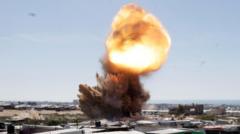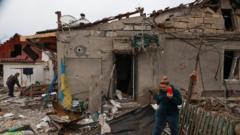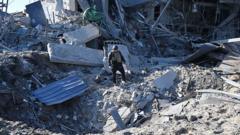A new ceasefire proposal has been tabled that includes significant terms aimed at ending the prolonged conflict between Israel and Gaza.
**New Ceasefire Initiative Emerges Amid Ongoing Israel-Gaza Conflict**

**New Ceasefire Initiative Emerges Amid Ongoing Israel-Gaza Conflict**
Mediators from Egypt and Qatar present a potential roadmap for peace including long-term truce and prisoner exchanges.
The recent escalation in violence has led to the tragic loss of many lives, with ongoing tensions sparking the need for renewed diplomatic efforts. According to a senior Palestinian official, new negotiations facilitated by Qatari and Egyptian mediators have unveiled a peace plan seeking to establish a ceasefire lasting five to seven years. It includes exchanges between Israeli hostages and Palestinian detainees, the formal conclusion of hostilities, and a total Israeli withdrawal from Gaza.
A Hamas delegation, led by the political council's head Mohammed Darwish and chief negotiator Khalil al-Hayya, is set to discuss the plan in Cairo following the breakdown of the last ceasefire just a month prior, largely attributed to mutual accusations of irresponsibility from both sides. Prime Minister Benjamin Netanyahu has yet to publicly address the recent mediation efforts but has reiterated that military action will continue until Hamas is dismantled and hostages are returned.
In a significant show of flexibility, Hamas has expressed a willingness to transfer governance in Gaza to a Palestinian body agreed upon collectively, which could involve the West Bank-based Palestinian Authority (PA), though Netanyahu has dismissed this possibility. The intense conflict has led to catastrophic consequences, with the death toll rising dramatically on both sides and significant humanitarian crises intensifying in Gaza.
As diplomatic discussions continue, the Palestinian Embassy in Cairo has relocated personnel, reflecting the ongoing need for humanitarian support amidst a climate of uncertainty regarding the future of governance and stability in the region.
A Hamas delegation, led by the political council's head Mohammed Darwish and chief negotiator Khalil al-Hayya, is set to discuss the plan in Cairo following the breakdown of the last ceasefire just a month prior, largely attributed to mutual accusations of irresponsibility from both sides. Prime Minister Benjamin Netanyahu has yet to publicly address the recent mediation efforts but has reiterated that military action will continue until Hamas is dismantled and hostages are returned.
In a significant show of flexibility, Hamas has expressed a willingness to transfer governance in Gaza to a Palestinian body agreed upon collectively, which could involve the West Bank-based Palestinian Authority (PA), though Netanyahu has dismissed this possibility. The intense conflict has led to catastrophic consequences, with the death toll rising dramatically on both sides and significant humanitarian crises intensifying in Gaza.
As diplomatic discussions continue, the Palestinian Embassy in Cairo has relocated personnel, reflecting the ongoing need for humanitarian support amidst a climate of uncertainty regarding the future of governance and stability in the region.





















